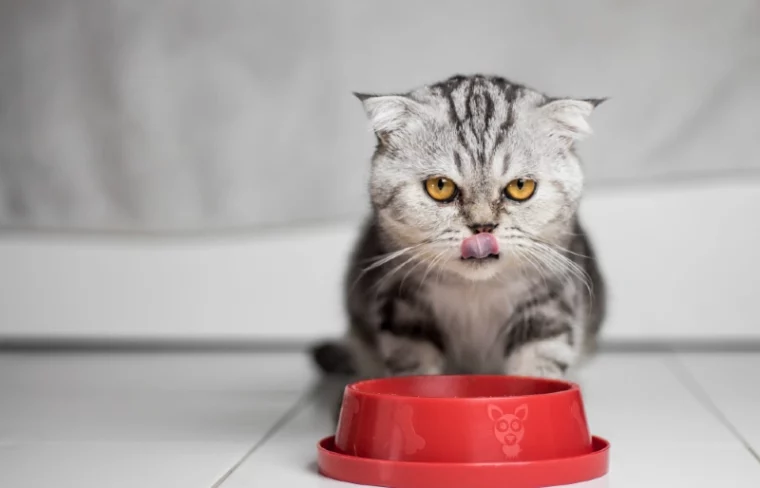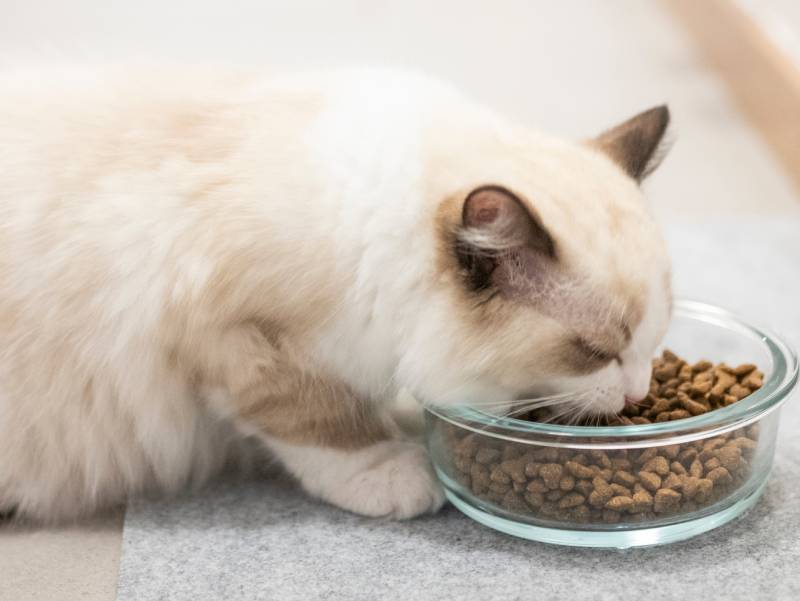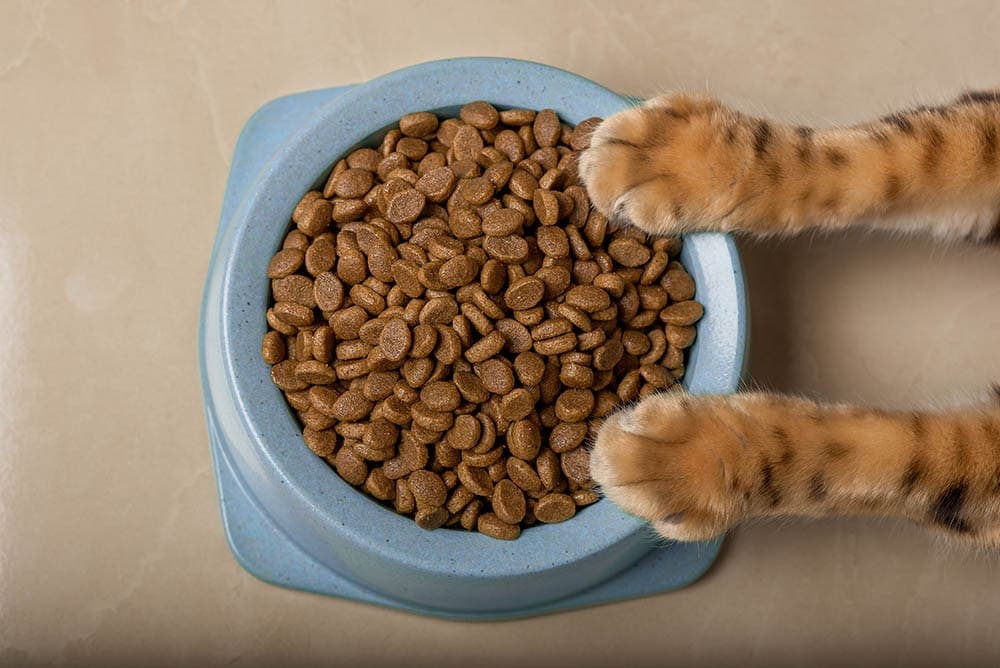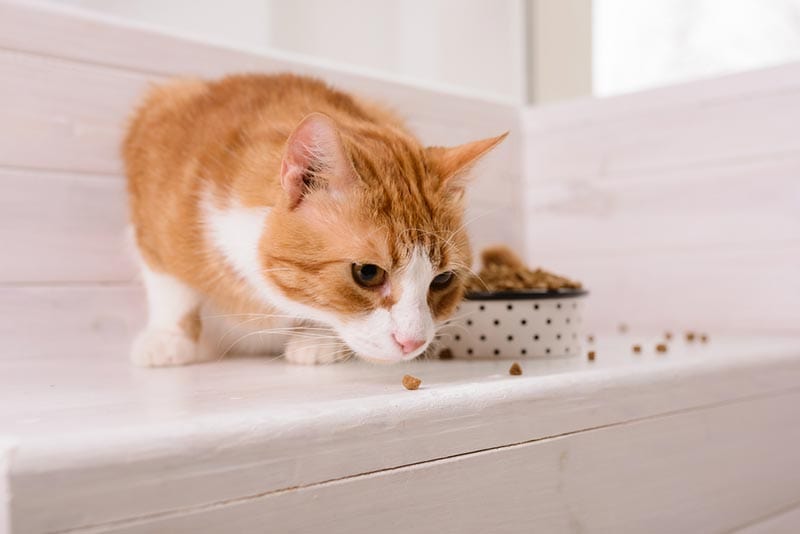
Click to Skip Ahead
It’s probably not much of a surprise to hear as a cat owner that not all cats do well on just one type of food. In addition to some cats needing a variety of food options for optimal health, you may also need to change your cat’s diet throughout their lifetime. To compound the matter further, some cat owners can be very passionate about the brand and ingredients of their feline friend’s food, and the concept of choosing or changing a food can be flavored by strong emotions!
In this article, we discuss and explore some potential reasons for a food change and explore tips that may make this process go more smoothly for you and your cat.
Cat Nutrition
Cats are defined as being true carnivores, although there is much more to the issue of complete nutrition than just eating meat. While cats derive energy from the food they eat, their bodies also require essential nutrients that they cannot live without. The nutrients essential to a cat’s diet include water, amino acids derived from protein, fatty acids derived from carbohydrates, as well as a variety of vitamins and minerals 1.
Domesticated cats are not “mini dogs” or even “mini lions.” In fact, health problems can occur when cats are given diets that are not formulated for them. This might occur if a cat owner simply provides their cat with dog food or a homemade diet from home-cooked ingredients. Such diets are not specifically formulated and reviewed by a veterinary nutritionist for cat health and such a diet could ultimately result in a variety of health issues.
Having a healthy cat includes having proper nutrition, and a good diet can also be a prevention against potential health problems. For cats facing certain medical issues, a specially formulated diet may even be recommended by a veterinarian as treatment.

The 6 Signs It’s Time to Change Your Cat’s Food
1. Stage of life
From a nutritional standpoint, a cat’s life can be divided into different stages according to its age and reproductive status. These stages can include kitten, maintenance for an adult, or a pregnant or lactating female. With each of these stages, a cat’s metabolic and nutritional needs will vary, and specific foods can be provided at those stages of life to provide for those individual needs. As a cat moves along in life, it’s best to switch to a food that will best fit their new stage.

2. Medical reasons
Cats can experience a variety of medical issues requiring special nutrition, with some examples discussed further below.
2. Simplicity
Sometimes it’s easiest—if there are no medical reasons not to—to have all the cats in a multi-cat household on the same diet. If one cat in the household is on a specific food for a reason, it may make more sense to have the others switch to this food, too. Budget, logistics, time, money, and inter-cat dynamics may all factor into this decision.

3. Change in owner’s opinion or resources
A cat owner may switch the brand/type of cat food based on a number of reasons, including hearing the viewpoints, opinions, or recommendations of others. They may also learn new scientific information that influences a change in what they want to feed their pet. Also, one’s discretionary budget may change, resulting in a switch to a food that is more suited to their current situation. And the list goes on and on!
4. Recall/availability
If a cat food has been recalled or there is difficulty in obtaining the food in question due to supply chain issues, etc. this may also be a reason why an owner may need to switch their cat’s food for the short term. Over time, consider that reliability both in quality and availability may be a good reason to consider a more permanent food switch.

5. Picky eater
As most cat owners know, cats can be finicky about many things, which sometimes includes their food! Some cats might like only canned food, others may want their dinner warmed up, and some may only want their meal at certain times of the day. If you have the opportunity with a younger cat or kitten, trying many different types or presentations of food can help them learn to not be as picky.
How to Choose the Best Food for Your Cat
A professional tip that may help you as you select the best food for your cat is to choose pet food companies that use rigorous feeding studies and employ veterinary nutritionists. A company that does this guides its decisions on sound data and the most current scientific information available. If you are having more nutritional problems or questions or may be intent on feeding a home-cooked diet, consulting with your veterinarian or a veterinary nutritionist can only further provide help for your cat!

How to Change Your Cat’s Food
When switching food due to health matters, it is best to consult your cat’s veterinarian as their individualized instructions will be based on the cause for the food change. For example, the instructions to change a pet’s food for a strict food trial will likely be different than if they start a diet to help with tartar and oral hygiene control.
When a cat’s diet is not being changed due to medical reasons, it is best done slowly, often over a 7 to 14-day period. If it’s done all at once, or too quickly, this can cause gastrointestinal (GI) upset, loose stool, and/or loss of appetite. In these circumstances, start by feeding your cat a high ratio of old food to new food. Over the course of a week or two (or even longer!), slowly decrease the ratio of old food to new food until the new food is all that is being given.
Help from Others
There are several different organizations, including government agencies, nonprofit associations, and even specialists, that can provide a variety of useful input regarding your cat’s nutrition. On a broad scale, one example is the Food and Drug Administration (FDA), which is a federal government agency in the United States. They regulate food made for animals to ensure safe production methods and accurate labeling, among other things. In addition, the nonprofit, The Association of American Feed Control Officials (AAFCO) also works to ensure animal and pet food safety, while setting food standards, definitions, and nutritional requirements to aid in laws, regulations, and testing standards.
On a more personal level, veterinary nutritionists are veterinarians who specialize and receive board certification in animal nutrition and rely on scientific data to guide their work; they may work in the pet food industry, at veterinary schools, or in practices helping pet owners with the nutritional needs for their pets, including cats!
Conclusion
Feeding your cat the best food for their current health, stage, and condition is a potentially constantly evolving endeavor that will require you to change their diet over time. For the best result, become familiar with the recommendations of AAFCO, base your decisions on scientific data and veterinary-recommended sources whenever possible, and consult with your cat’s veterinarian regarding your specific pet’s needs.
Doing so will equip you with the knowledge and tools you need to give your cat the best diet possible!
Featured Image Credit: P Stock, Shutterstock








